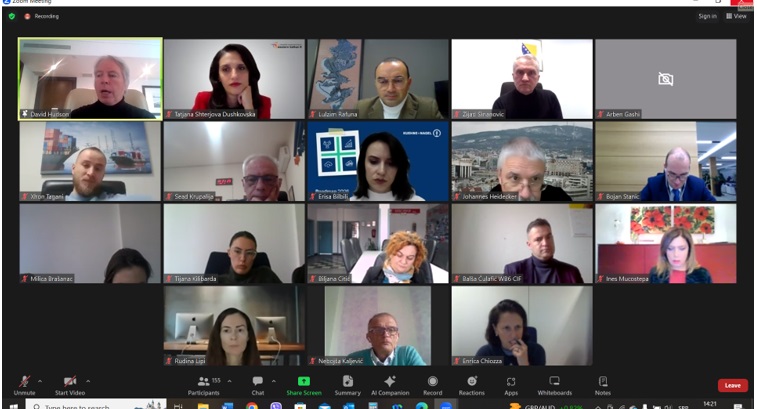
New Growth Plan – Opportunities for the Western Balkans Business Sector
The New Growth Plan for the Western Balkans represents a new turning point in the approach of the EU towards the Western Balkan economies, promising to open up further possibilities for access to the EU Single Market for our companies well before EU accession.
Within CEFTA Week 2023 the Western Balkans 6 Chamber Investment Forum organized a roundtable to bring the new Growth Plan closer to the business community in the region, jointly with European Commission and regional partners (CEFTA, the Regional Cooperation Council and the Transport Community).
The Growth Plan aims to bring some of the benefits of membership to the region in advance of accession, boost economic growth and accelerate much needed socio-economic convergence. The objective should be to enable partners to step up reforms and investments to significantly accelerate the speed of the enlargement process and the growth of their economies.
As stated by Mr David Hudson – DG NEAR, Senior Expert on EU enlargement „With the Growth Plan we want to double the size of the Western Balkan economies within the next decade (7% per year), incentivise countries to accelerate the adoption and implementation of the EU acquis and accelerate the accession process. There is now a big momentum and the Western Balkans need to take the advantages of it, specially taking into consideration the possibility to have new EU Member States by 2030 or soon after it”.
The Growth Plan is built on four pillars, which are interdependent and mutually reinforcing:
• Pillar 1: Bringing the Western Balkans closer to the EU Single Market in 7 priority actions, based on prior alignment with the EU acquis;
• Pillar 2: Deepening regional economic integration within the Western Balkans, through the Common Regional Market, a stepping stone towards the EU Single Market;
• Pillar 3: Accelerating reforms – each Western Balkan partner would be able to benefit from the Single Market only if the fundamental reforms are conducted at national level;
• Pillar 4: Increased financial assistance (conditional on implementing reforms) through the proposal for a new financing instrument ‘the Reform and Growth Facility for the Western Balkans’ worth EUR 6 billion in grants and loans.
The foreseen payments are linked to the achievement of quantitative and qualitative steps linked to these measures over the period 2024-2027 and are subject to the following conditions:
Ø Preconditions: democracy, rule of law and human rights (in addition to the condition that Serbia and Kosovo engage constructively in the normalisation of their relations)
Ø General conditions: Macro-financial stability, sound public financial management, transparency and oversight of the budget (same as for usual budget support);
Ø Payment conditions: specific to each partner, defined in the reform agendas.
Ms Enrica Chiozza – DG NEAR, team leader Western Balkans Investment Framework (WBIF), explained that half of the EUR 6 billion proposed under the Reform and Growth Facility will go to support national budgets and the other half will go for investments through the WBIF. The WBIF will focus on infrastructure, transport, energy, green and digital transition, human capital development while still supporting private sector competitiveness through more traditional instruments.
More than 160 participants took part in the meeting and highlighted that the Growth Plan is ambitious and to take advantage of the new opportunities we need to take small steps and work closely with governments and other institutions, while businesses should seek ways to improve their internal capacities and enhance business cooperation in the region, as a prerequisite for any further developments.
President Branko Azeski, from the Economic Chamber of North Macedonia, praised the efforts of the European Union, and commented that institutions lack capacities at national level to implement certain initiatives. The burden of corruption, grey economy (reaching 40% of the total economic activity) should be overcome through unhindered implementation of agreements and asking for help to solve problems that jeopardise development. Without developing rule of law and respect of market economy principles we cannot make further progress.
Some of the questions from participants addressed skills gaps and matching education and needs of the real sector within the region to be important part of the Reform Agendas at national level. The Western Balkan economies should declare their needs and ask for help to overcome these issues.
“Now that the Growth Plan has been presented, we are far from counting this exercise done – on the contrary, now extensive activities are underway by all stakeholders, and let me state on behalf of the region’s private sector that we expect commitment, responsibility and devotion from the Western Balkan national governments, but also from European policy makers in the implementation of every single point that has been included in this plan, so that we can provide tangible benefits to our companies as soon as possible”, stated Mr Lulzim Rafuna, President of the WB6 CIF Managing Board.



